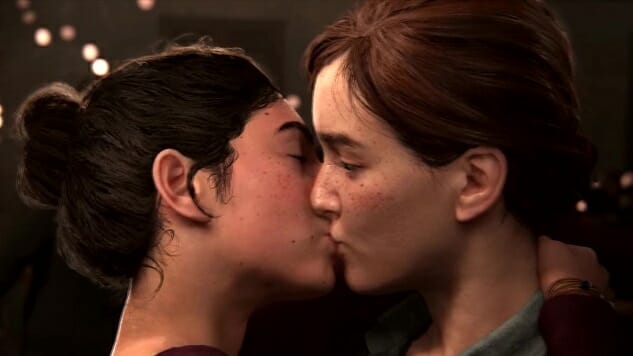Amid all the hype and hoopla from E3’s many press conferences this year, one quiet moment made more noise than every gunshot in every trailer combined. This year Sony opened its event with a trailer for The Last of Us Part 2, which featured a surprise: a very tender scene between Ellie and another woman, culminating in a kiss.
I don’t know about your social media feed, but mine went wild. And why not? It wasn’t that long ago that you never saw any depictions of a gay relationship in videogames at all, much less a humanizing one.
For many, however, myself included, the enthusiasm comes saddled with caution. Lately it seems there is a growing number of same sex relationships between women in media, and that’s a good thing. But as entertainment starts to take baby steps out of the closet, it’s hard not to notice whose sexuality is embraced, and whose is still overlooked. Sometimes it seems as though lesbians are the go-to group for gay representation simply because they do not threaten the sexuality of straight cis men. That sexual expression has been co-opted and its context framed as a performative act, to be even less threatening: after all, how could a straight cis man feel excluded by woman on woman action if he gets a front row seat? If he can shape it to serve his sexual purposes, the rejection can be repurposed to serve his ego.
This, among other reasons, is why I’m a little wary of Sony’s intentions. Not the writers, exactly—it was already known that Ellie is gay, and I’m sure Naughty Dog are sincere in their love for the character. But if gay representation is still only presented in a way that does not threaten the patriarchal status quo, are any gains really being made? If it’s only on the terms of straight cis men and within their comfort levels, is it even progress at all?
Of course, this question assumes that “progress” is everyone’s primary concern. For many, it was actually just really nice to see an open expression of gay love. Too often we’re asked to make due with innuendo and subtext because creators won’t take the social risk of being direct. It’s nice to enjoy being seen out in the open—to forget, for a moment, the hatred and fear we’re so often subjected to. It’s freeing.
But it’s also worth examining why this creative decision was made, or rather, why the publishers and investors were okay with this particular type of risk. The corporate world has a long history of hopping on the progressive bandwagon only once it’s safe and socially acceptable to do so. If we’re quick to give them brownie points, we award them credit for inclusivity when they haven’t done the work to be a force of influence themselves. A company like Sony doesn’t have to follow the rules—they can make the rules. But so far they’ve mostly stayed within the boundaries of social acceptability. Would they be willing, say, to show Nathan Drake making out with another man? Would they be willing to challenge our perceptions of masculinity and power by divorcing it from heteronormativity?
Not everyone feels as I do, and that’s okay. As some of my followers pointed out, there was a negative, and sometimes homophobic, reaction to Ellie and Dina’s on-screen kiss in other corners of the internet. In the end, even if portraying two women kissing is the safer choice, it’s still not entirely safe. To deny that would be to deny that gay women are discriminated against or punished socially for their sexuality at all.
But games designers, if your activism is safe, then it’s probably not effective. If you want to represent gay people, own it. Even if that means losing some fans in the process.
Holly Green is the assistant editor of Paste Games and a reporter and semiprofessional photographer. She is also the author of Fry Scores: An Unofficial Guide To Video Game Grub. You can find her work at Gamasutra, Polygon, Unwinnable, and other videogame news publications.